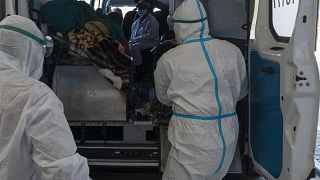Opération Barkhane
Although France officially declared the end of the military presence of its seven-year Barkhane operation in Africa's Sahel region -- decreasing its over 5,000 troops in the coming months, it appears that its forces are still being confronted by further Islamist extremist threats.
The same violence linked to al-Qaida and the Islamic State in the Sahel that saw the international anti-terrorism partner offensive in the area come about, to begin with.
Colonel Stephane Gouvernet, battalion commander for France's recent Equinoxe mission in northern Mali, said jihadists there were trying to impose Sharia law, enforce a dress code, and ban young children from playing football.
"We were witness of the presence of the enemy trying to impose Sharia law, denying young children to play football, cut the pants of all villagers, and imposing a dress code, denying also girls to making… and we are also witnesses of some scars on shoulders and back of the villagers who were reluctant to approach to such law."
A special unit called the Takuba task force that will see the participation of both other European countries and African regional partners will replace the Barkhane force as the new anti-jihadist terrorism and violence initiative to patrol the Sahel
"We are facing something that is going to be for years," said Col. Yann Malard, Operation Barkhane's representative in Niger.
"For the next ten years, you will have terrorists in the area. For instance, my part is the Nigerian forces, we get the same in Mali and Chad and other countries.
"So to build the partnership, meaning, build the capacity, build the confidence, and help them to fight very efficiently the terrorist groups. And this is going to be a long fight because like I said, the area is huge and all the terrorist groups are disseminated among the country."
As this transition plays out, political and security crises in the region persist with spikes in attacks in Burkina Faso and Niger leaving cause for concern. This in addition to instances of political instability -- as has been the case of Mali which underwent in May its second coup in nine months.
Oumarou Moumouni's family is living under a tree and struggling for food after Islamic extremists attacked their village near Niger's capital and stole their cattle. The jihadis warned they'd return the next day and kill anyone who remained.
"Even though the French are still here, attacks and killings continue daily, even with the French here. We are really hoping for peace. It's all we need right now, peace" said the 26-year-old father.
Sahel experts say Paris has been seeking a way out for years and that its strategy was always to manage the problem rather than to dedicate the necessary resources to defeat jihadists.
Some locals are fearful of the uncertain near future while others believe peace will finally come with the departure of the former coloniser.












01:35
UN and Haitian officials mark one year since Kenyan police arrived to support security efforts
01:31
Sahel region hardest-hit by terrorism worldwide, says Global Terrorism Index 2025
02:04
Wagner Group faces war crime accusations over posting atrocities on social media
Go to video
Nigerian president orders crackdown on gangs after 150 killed in conflict-hit north
01:49
Russia says it plans to boost economic and military cooperation with Africa
Go to video
Sheep markets struggle in Niger ahead of Eid al-Adha amid insecurity and economic strain